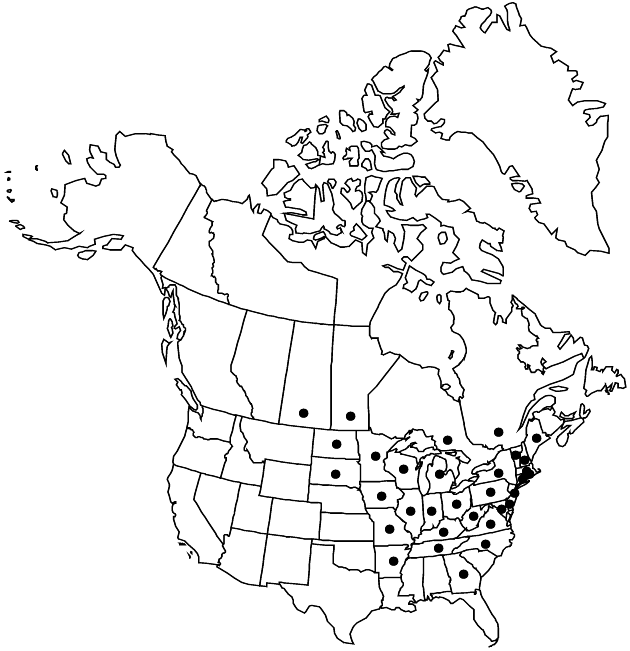Prenanthes alba
Sp. Pl. 2: 798. 1753.
Plants 20–175 cm; taproots short and thickened, fibrous. Stems erect, often mottled purple or nearly all purple (often with stout bases, 8–12 mm diam.), proximally glabrous, tomentulose distally. Leaves: proximal present at flowering; petioles narrowly winged (to 18 cm); blades usually ovate to triangular or cordate, 4–30 × 3–18 cm, thin to coriaceous, bases often hastate, margins usually coarsely dentate or serrate, sometimes deeply 3-lobed or parted, lobes acute, faces glabrous adaxially, pale to whitish and sometimes hirsute abaxially; distal reduced. Heads (3–8, in clusters) in paniculiform arrays (densest near apices). Involucres cylindric to campanulate, 13–15 × 3–5 mm. Calyculi of 5–7, triangular to lanceolate bractlets 1–3 mm, glabrous. Phyllaries (6–)8(–9), ± purplish or maroon, lanceolate, 10–13 mm, margins scarious, minutely ciliate, apices acute, faces glabrous. Florets 7–9(–13); corollas whitish to pale pink, lavender or red, 9–15 mm. Cypselae brown or tan, elliptical to linear, 3.5–6 mm; pappi usually reddish brown, sometimes rusty, rarely yellowish, 6–7 mm. 2n = 32.
Phenology: Flowering Aug–Oct.
Habitat: Sandy oak-scrub, open oak-hickory woods, deciduous forests, dunes, creek banks, road cuts
Elevation: 100–200 m
Distribution

Man., Ont., Que., Sask., Ark., Conn., Del., Ga., Ill., Ind., Iowa, Ky., Maine, Md., Mass., Mich., Minn., Mo., N.H., N.J., N.Y., N.C., N.Dak., Ohio, Pa., R.I., S.Dak., Tenn., Vt., Va., W.Va., Wis.
Discussion
Prenanthes alba is recognized by the purplish stems, relatively large, coarse, ovate or triangular leaves, relatively long, winged petioles, glabrous and often purple phyllaries, and usually reddish brown pappi. The leaves are variable, occasionally deeply 3-lobed. W. L. Milstead (1964) recognized specimens with a pale yellow pappi as “subsp. pallida,” distributed on the east coast in New Jersey, Virginia, and North Carolina. Because pappus color tends to fade somewhat on herbarium specimens, that character is difficult to assess on older specimens. The name was not validly published.
Selected References
None.